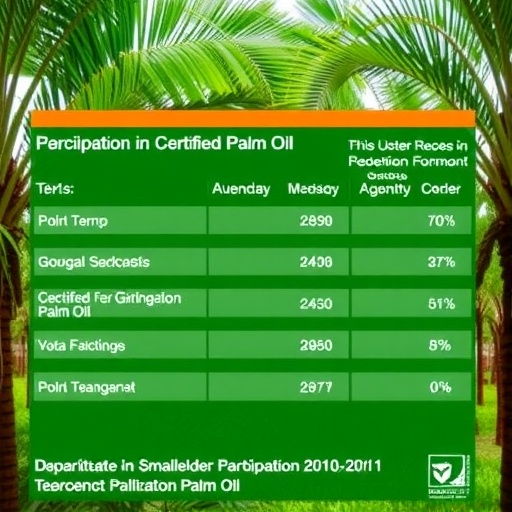In recent years, the palm oil industry in Indonesia has garnered global attention; however, the dynamics of market participation among smallholders remain largely underexplored. A groundbreaking study led by Ekaputri et al. titled “Uneven participation of independent and contract smallholders in certified palm oil mill markets in Indonesia,” published in Commun Earth Environ, sheds light on the disparities faced by different types of smallholders in accessing certified palm oil mill markets. The study reveals a complex landscape of engagement, urging stakeholders to reconsider their approaches to inclusive market participation.
Palm oil is a key agricultural product in Indonesia, providing economic sustenance for millions while driving national development initiatives. However, the benefits of this industry are not distributed evenly. The research draws attention to independent smallholders, who grow oil palm without contracts, contrasting their experiences with those of contract smallholders, who have formal agreements with palm oil mills. This distinction is vital, as it encapsulates the broader issues of economic inequality and access to resource management that permeate the sector.
The methodology employed in this research is noteworthy. The authors conducted a comprehensive analysis involving field surveys and data collection from various regions where palm oil is cultivated. This empirical approach allowed them to examine the factors influencing market participation, such as access to information, financial resources, and the regulatory framework governing palm oil production. By doing so, they were able to capture the nuanced realities faced by smallholders, providing a rich context for their findings.
A major takeaway from the study is the shocking reality of unequal access to palm oil markets. The research highlights that contract smallholders benefit from higher stability and market prices due to their established relationships with mills. In contrast, independent smallholders often lack vital resources and market information, leading to poorer negotiation positions. This disparity not only affects their income but also raises concerns regarding the long-term sustainability of independent palm oil farming, which plays a crucial role in Indonesia’s agricultural landscape.
Moreover, the paper discusses the long-term implications of this uneven participation. As global demand for sustainably sourced palm oil rises, the ability of smallholders to access certified markets becomes critical. The authors argue that inclusive market systems are essential for achieving equitable outcomes, whereby all smallholders can compete on a level playing field. This would not only enhance their economic stability but also contribute to the overall sustainability of the palm oil sector.
Furthermore, the study delves into the role of certification schemes designed to promote sustainable palm oil production. These initiatives, while well-meaning, often favor those who are able to navigate the complexities of certification processes. Many independent smallholders find themselves at a disadvantage, which underlines a critical need for supportive mechanisms that assist them in obtaining certification and accessing premium markets. The authors suggest that targeted support, including training and financial aid, can help bridge the gap between different smallholder categories.
Additionally, the impact of local governance and policy frameworks on market participation is an area of focus in the research. The results indicate that inconsistent regulatory environments can hinder smallholders’ ability to engage efficiently with markets. Therefore, fostering transparent and predictable policies could significantly improve the market landscape for independent smallholders. A collaborative approach between government entities, NGOs, and private sector stakeholders is essential to establish a conducive environment for healthy market competition.
The implications of this research extend beyond Indonesia, resonating with global discussions around equitable agricultural practices and sustainable resource use. The authors contend that the findings reflect broader systemic issues faced by smallholders worldwide, particularly in commodity-driven economies. As countries continue to grapple with the challenges of balancing economic growth with environmental sustainability, insights gained from this study could inform policies and practices across the globe.
In conclusion, Ekaputri et al. present a compelling case for the urgent need to address disparities among smallholders in Indonesia’s palm oil production landscape. By shining a spotlight on the uneven participation of independent and contract smallholders in certified markets, the study not only highlights existing inequalities but also calls for action to create a more inclusive and equitable agricultural sector. The future of Indonesia’s palm oil industry—and that of countless smallholders—depends on recognizing these disparities and actively working towards changes that allow for fairer access to economic opportunities.
As the world continues to prioritize sustainable practices, the findings from Ekaputri et al. serve as a critical reminder of the disparities that exist within supply chains and the importance of ensuring equitable access for all producers.
Subject of Research: The dynamics of market participation among independent and contract smallholders in the Indonesian palm oil sector.
Article Title: Uneven participation of independent and contract smallholders in certified palm oil mill markets in Indonesia
Article References:
Ekaputri, A.D., Gaveau, D.L.A., Heilmayr, R. et al. Uneven participation of independent and contract smallholders in certified palm oil mill markets in Indonesia.
Commun Earth Environ 6, 721 (2025). https://doi.org/10.1038/s43247-025-02683-6
Image Credits: AI Generated
DOI: 10.1038/s43247-025-02683-6
Keywords: palm oil, smallholders, market access, Indonesia, certification, agricultural sustainability.




